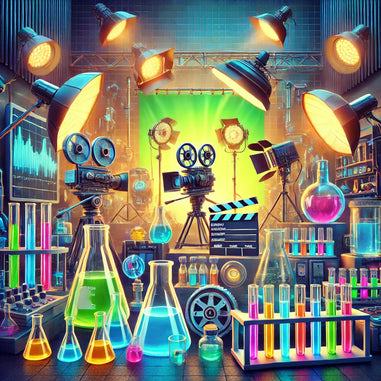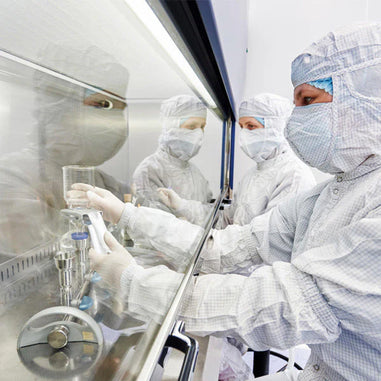- No products in the cart.
Water is an essential resource that sustains life on Earth, making the health and purity of our water sources critical for both human survival and environmental sustainability. Water laboratories play a pivotal role in safeguarding this vital resource. They contribute significantly to environmental conservation efforts by monitoring pollution levels, supporting sustainable water management practices, and ensuring compliance with environmental regulations. This blog explores the multifaceted roles of water labs in environmental conservation and highlights the essential laboratory supplies and chemicals used in these vital processes.
Monitoring Pollution Levels
One of the primary functions of water laboratories is to monitor pollution levels in various water bodies, including rivers, lakes, groundwater, and oceans. By analyzing water samples, these labs can detect pollutants such as heavy metals, pesticides, industrial chemicals, and pathogens. This monitoring is crucial for several reasons:
-
Early Detection of Contaminants: Timely identification of pollutants helps in taking immediate corrective actions to prevent further contamination. This is especially important for drinking water sources, where human health can be directly impacted by water quality.
-
Assessing Environmental Impact: Water labs provide data that help assess the environmental impact of industrial activities, agricultural runoff, and urbanization. This information is essential for developing strategies to mitigate negative effects on ecosystems.
-
Regulatory Compliance: Governments and environmental agencies rely on water laboratories to ensure that industries and municipalities comply with water quality standards. Regular testing and reporting help enforce regulations designed to protect water resources.
Supporting Sustainable Water Management Practices
Sustainable water management is critical for conserving water resources and ensuring their availability for future generations. Water labs contribute to these efforts in several ways:
-
Water Quality Assessment: By regularly testing water quality, laboratories provide data that inform sustainable water management practices. This includes determining the suitability of water for various uses such as drinking, irrigation, and industrial processes.
-
Resource Management: Water labs help in the efficient management of water resources by providing data on the availability and quality of groundwater and surface water. This information is crucial for developing water allocation plans and managing droughts and floods.
-
Pollution Control: Laboratories play a key role in designing and evaluating pollution control measures. For instance, they can assess the effectiveness of wastewater treatment plants and suggest improvements to reduce the discharge of harmful substances into water bodies.
Crucial Laboratory Supplies and Chemicals for Environmental Testing
To perform these critical functions, water laboratories rely on a range of sophisticated equipment, consumables, and chemicals. Here are some of the essential supplies:
-
Chromatography Systems: These are used to separate and analyze complex mixtures of substances. Gas chromatography (GC) and liquid chromatography (LC) are common techniques used to detect and quantify pollutants like volatile organic compounds (VOCs) and pesticides in water samples.
-
Spectrophotometers: These instruments measure the intensity of light absorbed by a sample at different wavelengths. They are used to detect and quantify various contaminants, including heavy metals and nutrients.
-
Laboratory Consumables: Water labs require a steady supply of consumables such as glassware, pipettes, filters, and sampling bottles. These items are essential for collecting, preparing, and analyzing water samples.
-
Chemicals and Reagents: A wide range of chemicals and reagents are used in water testing. These include acids and bases for pH adjustment, reagents for colorimetric analysis, and solvents for chromatography. High-purity chemicals are essential to ensure accurate and reliable test results.
-
Field Equipment: Portable devices such as pH meters, conductivity meters, and dissolved oxygen meters are crucial for on-site testing and monitoring. These tools allow for immediate assessment of water quality in the field.
-
Microbiological Testing Supplies: To detect pathogens and microbial contamination, water labs use microbiological testing supplies such as culture media, petri dishes, and incubators. These are essential for ensuring the microbiological safety of drinking water and recreational waters.
Challenges and Future Directions
While water laboratories are indispensable for environmental conservation, they face several challenges. These include the need for continuous training of personnel, maintaining and upgrading equipment, and ensuring the availability of high-quality reagents and consumables. Additionally, the increasing complexity of water pollution requires the development of new analytical methods and technologies.
Looking ahead, advancements in technology such as remote sensing, automation, and data analytics are expected to enhance the capabilities of water laboratories. These innovations will enable more efficient monitoring, better data management, and quicker response times to environmental threats. Furthermore, collaboration between water labs, regulatory bodies, and the public is essential to achieve comprehensive and sustainable water management.
Conclusion
Water laboratories are at the forefront of environmental conservation efforts. By monitoring pollution levels and supporting sustainable water management practices, they play a crucial role in protecting our water resources. The sophisticated equipment and chemicals they use are essential for accurate and reliable water testing. As we face growing environmental challenges, the importance of water labs will only continue to increase, underscoring the need for continued investment and innovation in this vital field.
For over 40 years, Lab Pro Inc. is your steadfast source for premium lab glassware equipment including filtering flasks, hand tools, lab equipment, chemicals, and PPE apparel. Trusted by aerospace industries, medical device companies, and laboratories globally, we epitomize exceptional quality in every product. Experience the convenience of next day service in California. Contact us online or at 888-452-2776 to explore solutions tailor-made for the laboratory industry. Elevate your experiments with Lab Pro Inc. – your partner in precision and excellence.












































